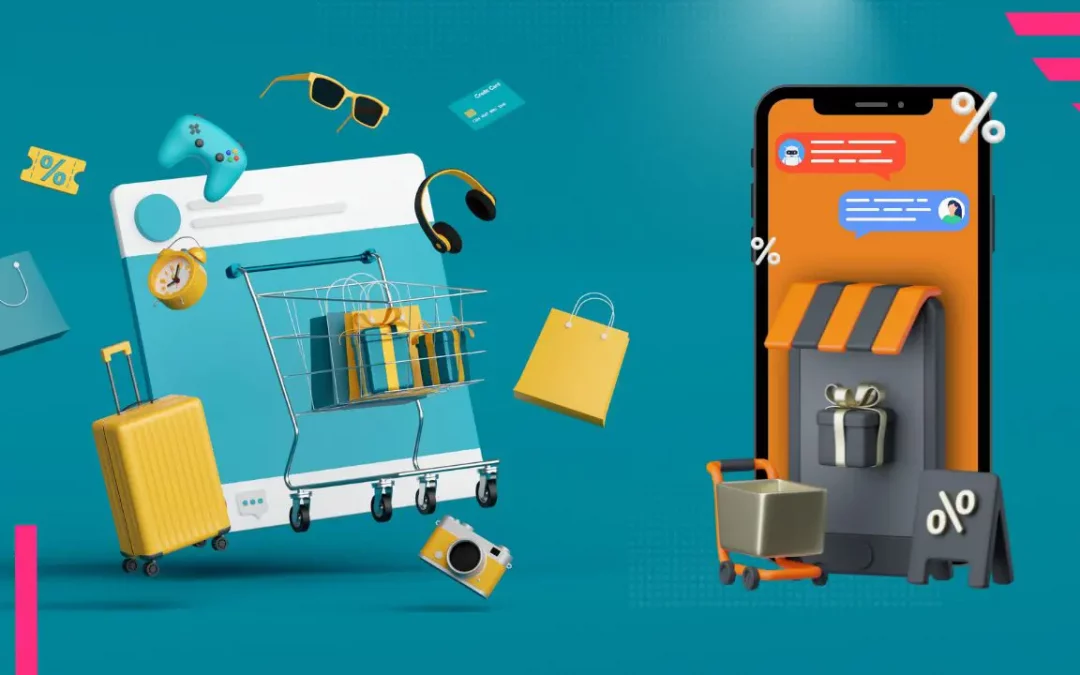Integrating an AI ecommerce Chatbot is mandatory to revolutionize the online customer journey,, making each phase of the shopping experience more personalized, seamless, and interactive.
In the past, customers had to navigate catalogs and options on their own, but today, thanks to advanced chatbots and virtual assistants powered by generative AI, they can receive tailored recommendations in real time, find immediate answers to specific questions, and obtain ongoing support through to purchase completion.
An AI ecommerce chatbot can interpret each user’s unique preferences and behaviors, offering personalized recommendations and engaging in natural language, similar to a human assistant. Moreover, during and after the purchase, the AI continues to monitor and gather feedback, creating a deepening relationship and transforming the customer journey from a standardized path to a unique, dynamic experience for each customer.
Amazon’s AI ecommerce Chatbot
E-commerce giant Amazon couldn’t pass up the challenge, introducing Rufus to its customers: an AI ecommerce chatbot designed to streamline the shopping experience and meet buyers’ needs.

Rufus can answer complex questions, recommend specific products, compare items, and suggest gift ideas. This development aims to provide an experience akin to an in-store assistant, allowing users to directly ask the bot questions like, “What are the best trail running shoes?” or “Which games are suitable for five-year-olds on rainy days?”
The real strength of Rufus lies in its use of generative artificial intelligence, capable of gathering and synthesizing information from Amazon and the web to provide personalized responses. This approach revolutionizes customer interaction, enabling responses to both general and specific questions and making every conversation a unique, relevant experience for the user.
What Does This Mean for E-Commerce Companies?
Amazon’s AI ecommerce chatbot serves as a direct invitation for all e-commerce companies to keep up with a new standard for online shopping, defined by efficiency, speed, and personalization.
With Rufus, Amazon doesn’t just improve its customer service but raises the bar for what consumers expect from a shopping experience: instant responses, 24/7 assistance, and personalized recommendations.
This means that, to stay competitive, other companies in the sector must evolve and adopt generative AI solutions capable of providing an equally smooth and intuitive interaction. Adopting a virtual assistant like Rufus sets a new benchmark, pushing e-commerce businesses to reevaluate their digital tools and invest in advanced technologies that meet rising customer expectations. Ignoring this transformation risks falling behind in a market where user experience is increasingly central.
Are AI ecommerce chatbots only for Large Companies?
Thanks to SaaS platforms that integrate generative AI, even small and medium-sized e-commerce businesses can now access this innovative technology on a budget. In the past, developing advanced chatbots like Rufus was reserved for giants like Amazon, with significant technical and financial resources. Today, however, SaaS platforms provide “plug and play” tools that enable the creation of customized chatbots without the need to build an AI infrastructure from scratch. Platforms like Crafter.ai offer pre-trained, ready-to-use language models that companies can personalize and adapt to their brand and products.
This democratization of AI technology allows businesses to offer an advanced, personalized customer support experience similar to that of large players, but with lower investment and without technical complexities. An AI ecommerce chatbot can handle orders, respond to frequently asked questions, suggest products, and guide customers through the entire purchase process, with the advantage of being able to refine and adapt responses based on user interaction. In this way, small and medium businesses can compete on a more level playing field, providing excellent service and increasing customer loyalty, thanks to the power of generative AI made accessible through SaaS.
In summary: the main advantages of an AI ecommerce chatbot
24/7 support and immediate responses
Unlike a human support team, a chatbot doesn’t need breaks, vacations or days off. He is always active and ready to help, ensuring that customers can receive assistance at any time of day or night. This is especially important in a global market where users may be in different time zones.
Product customization and suggestions
An AI ecommerce chatbot can offer personalized product suggestions, based on the customer’s browsing and purchasing data. For example, if a customer has previously purchased sportswear, the chatbot can offer similar or complementary products. This increases the chances of conversion and can turn a one-time visitor into a repeat customer.
Reduced cart abandonment rate
One of the main problems for e-commerce is cart abandonment. Chatbots can intervene to offer assistance or resolve problems that could block the transaction. For example, if a customer is having trouble completing a purchase, the chatbot can provide real-time assistance, solving the problem and encouraging the purchase.
Management of frequently asked questions
Many customers turn to customer service for common questions, such as return policies or shipping times. Chatbots can handle these types of requests autonomously, easing the workload of the human team and improving the overall efficiency of customer service.
Collecting data and insights for marketing
By interacting with customers, chatbots can collect valuable data about their preferences and purchasing behaviors. This information can be used to improve marketing strategies, personalize campaigns and optimize offers based on real customer needs.
Reduced customer support costs
Another great benefit of an AI ecommerce chatbot is the reduction of costs associated with customer support. By automating responses to common questions and streamlining requests, chatbots can dramatically reduce the need for human intervention, freeing up HR to focus on more complex issues. This not only improves customer service efficiency, but also allows businesses to reduce operating costs, especially during high-demand periods such as holidays.
Generative AI increases customer loyalty
One of the main factors that influence customer loyalty is the quality of interaction with the brand. When customers perceive that a brand is helpful, attentive and able to meet their needs quickly, they are more likely to return for future purchases. Thanks to AI chatbots’ ability to respond in a personalized and immediate way, customers feel that the brand truly cares about providing a positive experience. This type of positive interaction can create an emotional bond between the customer and the brand, leading to greater loyalty.
Support for omnichannel and cross-selling strategies
In the context of an omnichannel approach, AI chatbots can serve as a point of contact between various sales channels. They can interact with customers across the website, mobile app, and even on social media, maintaining consistent messaging and delivering a seamless experience. Furthermore, chatbots are an excellent tool for cross-selling: they suggest complementary products or upgrades, based on what the customer has already viewed or purchased. This not only increases the value of the average cart, but makes the shopping experience more fluid and engaging.
Integrating chatbots with other AI technologies for an enhanced experience
AI chatbots can be integrated with other technologies such as computer vision and augmented reality to offer an even more advanced shopping experience. For example, a customer could upload a photo of their home environment and the chatbot, via AI, would suggest furniture or furnishings that match the style of the room. This type of innovative interaction enriches the shopping experience and offers the customer the feeling of an exclusive and tailor-made service.
Conclusion: investing in an AI ecommerce Chatbot means to success
Generative AI is transforming the world of e-commerce, and to stay competitive, brands must embrace these technologies. An AI chatbot can increase customer satisfaction, reduce support costs and improve loyalty, making it an essential tool for any e-commerce. Through personalized responses, targeted product suggestions and continuous availability, chatbots offer customers fast and efficient service, increasing sales and consolidating brand reputation.
Investing in an AI ecommerce chatbot today means preparing for a future in which the customer experience will be increasingly personalized, engaging and aligned with digital expectations.
Contact Athics to learn more.

